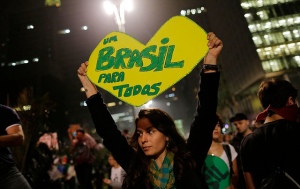Egypt’s coup presents the West with a massive dilemma as leaders try to work out how to respond.
Just a year after taking office after the country’s first free election for 30 years, Islamist Mohammed Morsi was unceremoniously removed from power and placed under arrest.
While neither Cameron or Obama will shed a tear at seeing the back of Morsi’s Muslim Brotherhood, they feel they can’t openly support a coup, even one brought about by a popular uprising, for fear of ‘setting a dangerous precedent’.
‘Democracy is a tricky thing to get right,’ people say and then go on to explain Egypt needs time to evolve into a Western style democracy.
This view is misted by our arrogance.
Actually, what’s happening in Egypt along with the protests in countries as diverse as Turkey and Brazil, should be seen as the dawning of a new type of democracy.
Protests like these happen when people feel they don’t have the ability to change things by the available political methods.
Those arguing for the supremacy of Western democratic structures say the public gets to judge its leaders at elections and any actions outside this risk causing undemocratic chaos.
As I write, the Egyptian army is only using blanks bullets and tear gas to quell the understandably angry supporters of the deposed president but they already report six deaths. We’d be very lucky if the numbers stay this low over the coming weeks.
There’s a substantial risk of the country slipping into a messy civil war but the fresh elections that Western leaders are calling for might not be the soothing remedy that they hope for.
The people now have a taste for affecting change and that genie might not be easy to put back in the democratic election bottle.
Maybe the answer is not to try.
Maybe we can move towards societies where citizens have more day-today power, through channels like referendums, and constitutionally binding petition policies, future political change could be built into systems and won’t involve military might or popular uprisings.
Technology is increasing access to information and allowing people to organise quickly and organically around individual issues or even just general displeasure.
For decades we’ve lamented that the connection between politics and the people has got weaker and weaker. Fewer people bother to vote or consider themselves politically aware.
With the main political parties across the world huddling together in tighter and tighter policy agreement and the world’s press presenting a smaller and smaller range of self-interested views, it’s no wonder politics has seemed remote from the lives of most people.
Social media has allowed information to break free from the grip of the mainstream media.
The Arab Spring, the London riots, Greek protests, Occupy movement, Turkish protests, Brazilian protests and many other smaller uprisings have all been fuelled not by the mainstream media but by people talking to other people.
We shouldn’t be afraid of people becoming more politically aware.
The only route to a truly fair world is by the people having wider awareness and a feeling that change really is possible.
Take a look a this video of a 12 year old Egyptian boy being interviewed about the troubles and tell me he doesn’t present a shining hope for the future.
Western nations which have constitutions understandably treat them as sacrosanct. In many cases they have served citizens for centuries.
But the US constitution didn’t stop slavery and regardless of the legal statues of individual ‘free’ nations, human rights remain suppressed all over the planet.
Democracy is defined as: Government by the people; a form of government in which the supreme power is vested in the people and exercised directly by them or by their elected agents under a free electoral system.
We seem to have forgotten the first part of this ‘by the people’ and instead are focussing on the ‘or by elected agents’ bit.
The democratic theorist Benjamin Barber says in his blog, A Stormy Summer for Democracy: The Arab Spring at Risk;
Speak not of the road to democracy but the roads to democracy: for there are as many paths to liberty as there are peoples and cultural histories. You cannot win freedom by imitating another country’s constitution or having friends Fed-X you their Bill of Rights.
It’s the voice of the people that matters and if we now have new ways of letting the people be heard then maybe it’s time to have constitutions and statutes which acknowledge this.
It seems strangely symbolic that Egypt’s latest revolution happened on the day Americans celebrate ousting those pesky British and taking control of their own destinies.
If Egypt can create a new type of constitution that allows closer scrutiny of political leaders by an informed and politicised public, the chaos might give birth to a new type of democracy.
If this happens then it’s the Western democracies that will then need to evolve.


